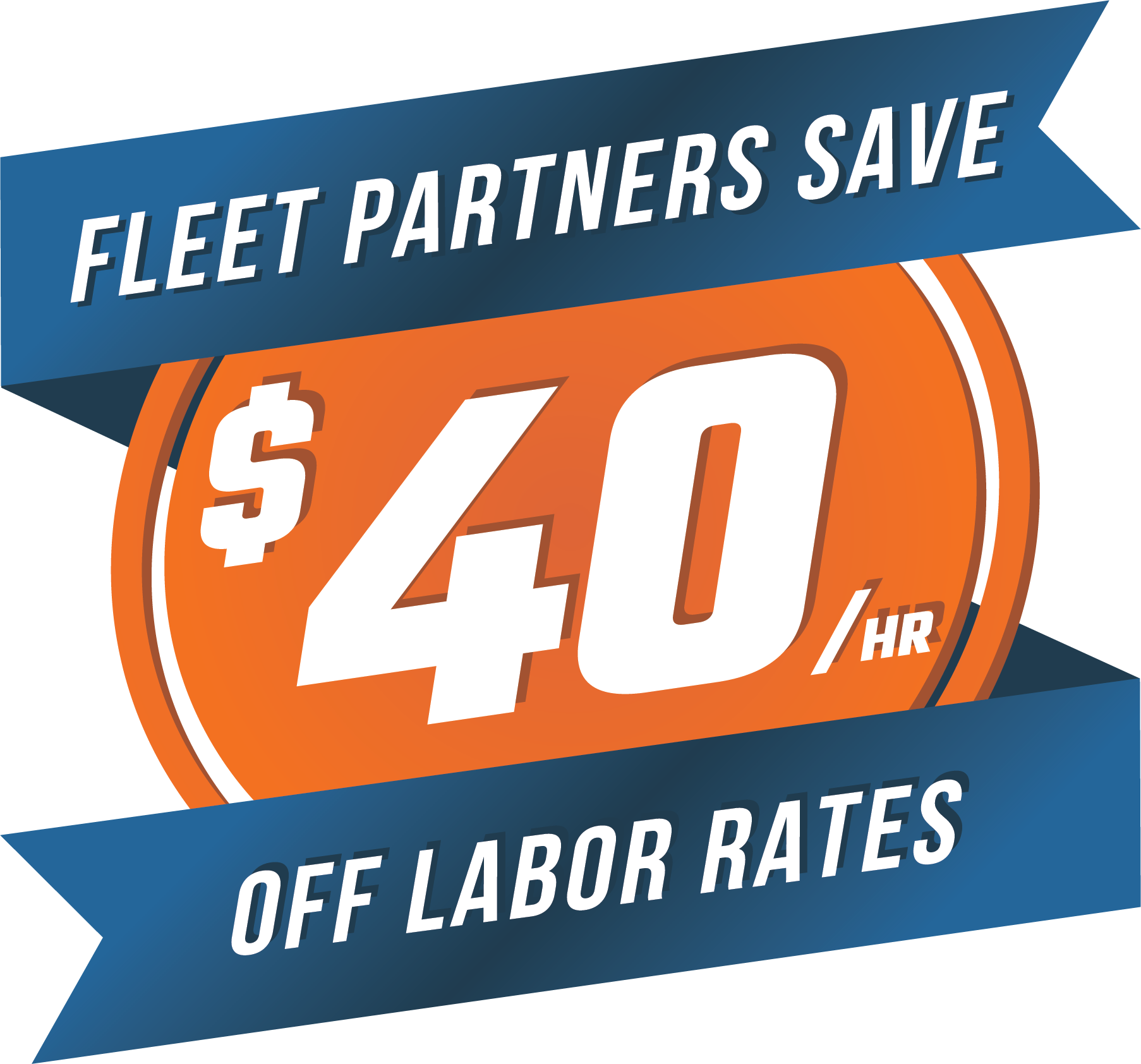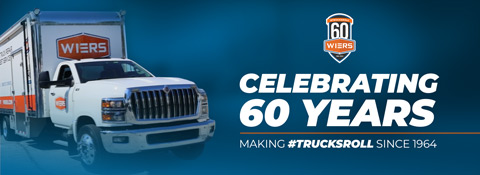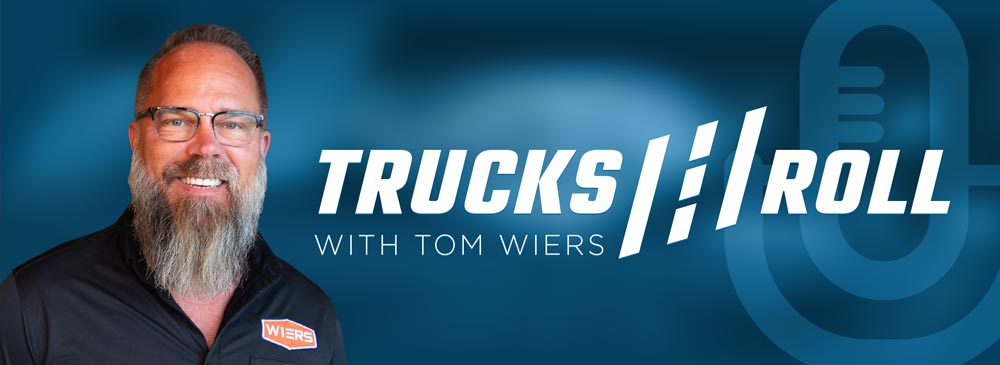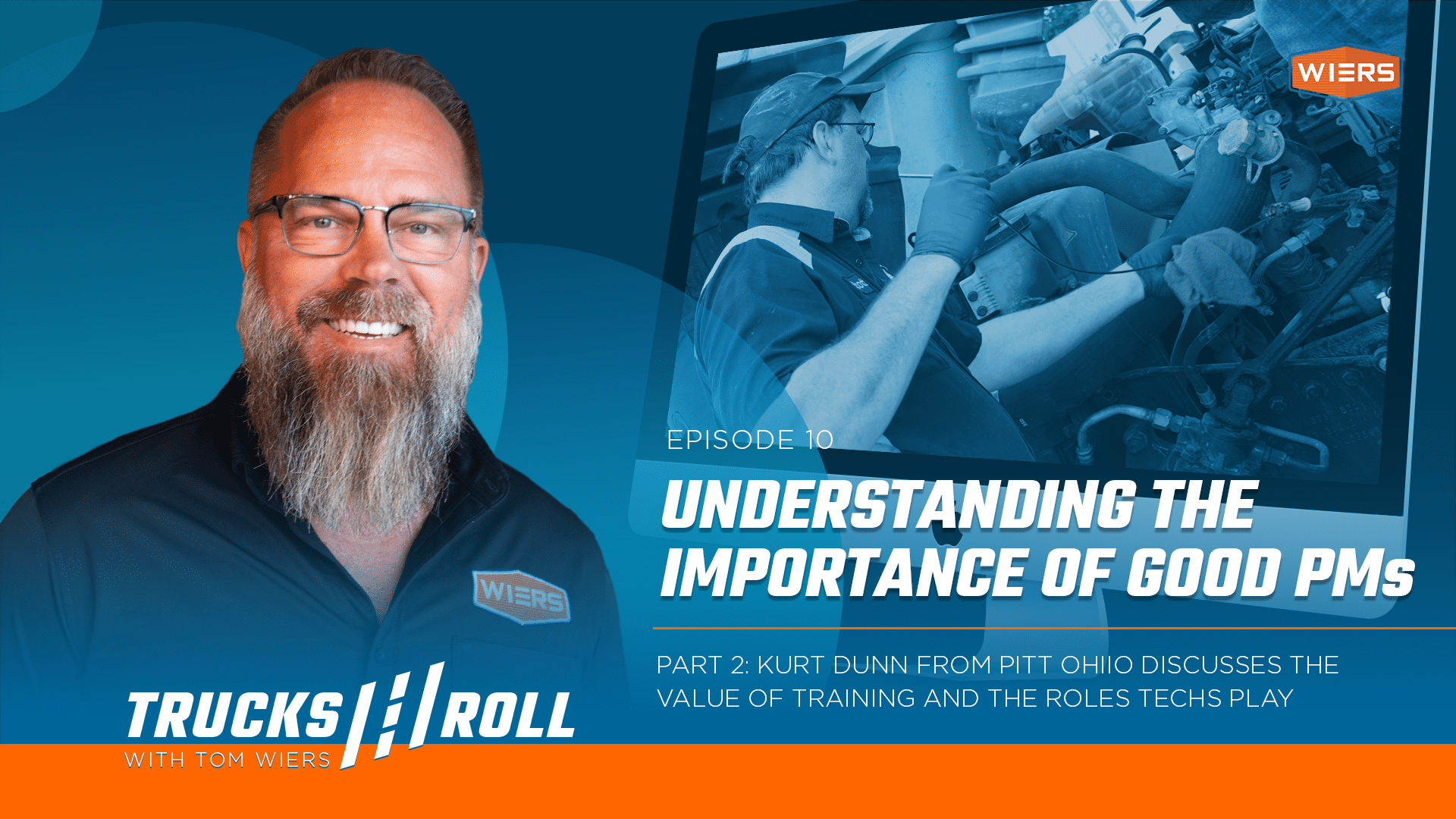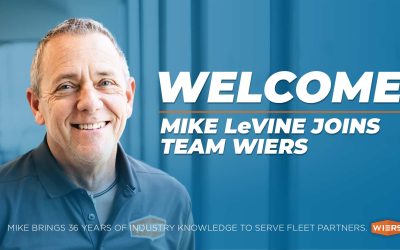
The Value of Preventative Maintenance, Part 2 – Trucks Roll, Ep. 10
Part 2: The Role Technicians Play in a Good PM Program
Join us for part 2 of our conversation with Kurt Dunn from Pitt Ohio about Understanding the Value of Preventative Maintenance. In this episode of the Trucks Roll Podcast, Kurt explains some of the uniqueness of his role at Pitt Ohio and the value that technicians play in a good PM program.
At Wiers, we strive to be experts in our field and love having relationships with people like Kurt to learn from as well.
Visit us at wiers.com today to learn more about our services and fleet partnership plans today!
What You’ll Learn
- How Pitt Ohio trains their technicians
- The importance of a trusted outsourcing partner
- The philosophy that preventative maintenance is the tool to keep diesel equipment running
Here is the transcript for Trucks Roll Ep. 10:
Kurt: Everything in our fleet, everything is treated exactly the same from the first miles of millions of miles. And we really view review preventative maintenance as kind of the way to keep that the tool to keep equipment healthy. If somebody were to pull a new truck in or we have a new truck come in, the first thing we do is give it a PM.
Tom: Hi. This is Tom Wiers bringing you the Truck’s Roll podcast. Today we have part two with Kurt Dunn from Pitt, Ohio. We’re going to be talking to Kurt about his unique role within the organization.
Tom: You said you’d mentioned you were a technician, but give us a little more background about Kurt when and how he came up through the ranks here and what you’re doing. You’re not working on trucks and trying to make maintenance programs better.
Kurt: Absolutely. So been with the company 15 years and it’s been it’s been a rollercoaster. I mean, it’s been a fun one, I should say a fun roller coaster. I mean, I started at our Allentown terminal as a mechanic. I had some time there as a lead mechanic, spent 11 years in the shop, you know, just just right in the heat of it. And, you know, when I over to talk about the story, because I feel like the pup, whenever we have these conversations, I feel like because I’ve only been in the industry 18 years and, you know, just coming up through but when I was in the shop, we were just getting admissions and you know, I know the basis is talking about preventative maintenance, but it was like everything we could do.
Kurt: I mean, it was, you know, the truck would go to a dealership. It was just we didn’t you know, we didn’t know at that point. There were so many histories with it. You know, we talk about the BEVs and I feel like that’s that’s going to be another time, like you mentioned. But so I was in the shop for 11 years at Ohio and, you know, I just I, I grew to love emissions. I know it sounds crazy and I probably need a psych eval after that one, but I would I grew to love diagnosing emissions and this position came up and I was like, You know what? I’m going to shoot for the stars. I’m going to send it.
Kurt: And I got it. I got the I got the technical advisor position. So I moved from Allentown to Pittsburgh and it was it was kind of off when my wife was actually eight months pregnant. When we moved so off a whim, I said, Let’s go to Pittsburgh this. Let’s see what we can do. So hopped out of the roller coaster, I mean, riding that technology rollercoaster for the last four years has been awesome, has been scary. I mean, technology moves so quick that what, you know, today, three months from now, it’s going to be different. It’s going to change. You just got it.
Kurt: You got to be all of that.
Tom: And you get a firsthand look at that on a daily basis. So that’s, you know, to hear you say that is helps remind us all how how dynamic it is and and you know, keeping the truck on the road is you know, it’s almost rocket science these days.
Kurt: It’s been almost is. It almost is especially you start growing 8000 and some of the safety systems in those computers and.
Tom: Yeah you know what what role are the technicians playing in this journey with you guys? I imagine, you know, they’re they’re out there touching the equipment. I’m sure. I know you work closely with them. So what is what have you seen with the technician involvement? What have they shared with you that you know, you probably weren’t thinking about?
Kurt: So we do want to step back and talk a little bit the training program, because what we what we have I talked about the training program that goes with the technical advisor role. And this is all going to play in… We do what we call tech calls. So depending on if we have an initiative like the PM initiative that we pushed out, the tech calls is where we’ll put that information out to the techs. And what we found out really quick, this is we were pushing information out to them like, hey, you know, we’ve noticed this and we’re going to start looking a little bit deeper at this part of the system. And the technicians were bringing stuff back to us.
Kurt: You know, it gives them that microphone that says, hey, we’re were listening and there was a really good transition of information from the technicians to us. And then back as we started working through this process. And that was part of why the process took so long as we were really diving in and the technicians play a huge role. You know, they they get to see the equipment, they get eyes on it.
Kurt: As much as you can look at data and you can look at the stuff, I mean, it really comes down to putting your hands on the part, getting there on that piece of equipment, saying, okay, like, is this bad or is this still good? And the technicians are always able they were kind of able to validate that information for us. And they put they put the new schedule to work. They put it to work. And they they they’re going to ultimately prove its effectiveness.
Tom: Right.
Kurt: That if they do good quality work, we have a lot of pride in our technicians for doing that. We’re going to see the results here real soon.
Tom: Yeah. That’s fantastic having there in Boulder. Have the drivers played any role in this in this initiative?
Kurt: They have not. They have not our our drivers, our operations department is great. And they do a great job, create sections and stuff. But our drivers haven’t really played any role in the in the actual PM program.
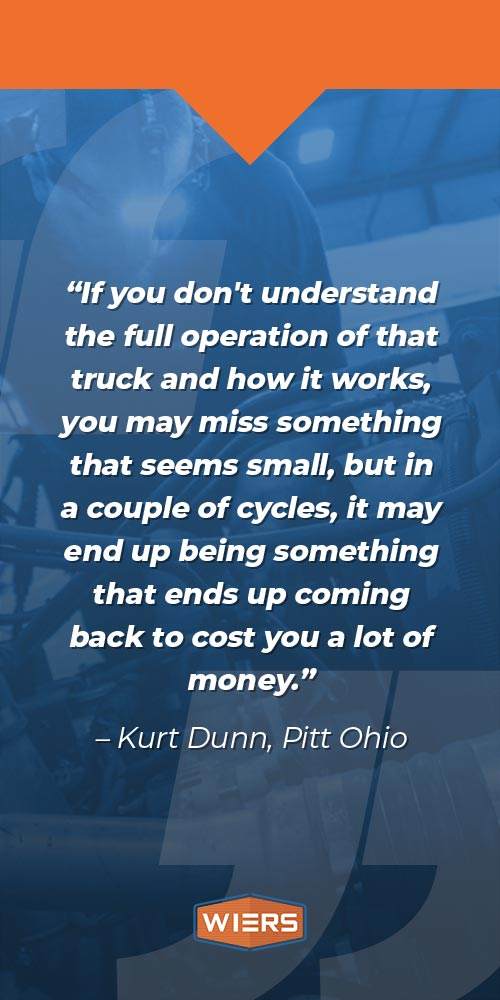
Tom: So they’re participating through the driver write ups and letting that letting the folks know what’s wrong with the trucks and such. And then the mechanics, the technicians are taking it from there.
Kurt: Yeah. Yep. And that’s the relay that those write ups to us is if we maybe push the park too far, they’ll relay that.
Tom: Okay. So as you’re working on your preventive maintenance and getting that improving, what how do you determine what what equipment you’re keeping in your shops for repair and what? And we talked a little bit about this at TMC, you know, where, when to outsource or you try to keep most of it in or are you doing any outsourcing?
Kurt: So we do we definitely do some outsourcing. I mean, we did have a great conversation on this. And it’s important to to keep those partners, outsource partners close and understand their philosophy towards it. Now, talking preventative means we like to keep most of it in-house. And it’s just it’s a it’s a preference of ours just because we learn so much of and shared about the data. If you see the same truck, we only run a few different specs. If you see that same truck every day, you’re fixing that same model truck every day. You start to understand where some of the fail points may be.
Tom: Right.
Kurt: Every manufacturer has them is. You start to understand what that manufacturer field points are, and that’s why we like to keep your vendors in-house. Now, there is a lot of stuff that we will or or some stuff that we will push out depending on level, like technical level, depending on if we have the tooling. It’s just one thing that, you know, now is not the time to learn, to learn a new job, to learn a new skill set. And even in that point, if it was a preventative maintenance thing, if there was a new truck that we brought into the fleet, we would work very closely with OEM support, dealer support and reps to really understand that truck front to back, top to bottom, and to make sure that we were able to prevent the maintenance, you know, do the best job preventing maintenance because if you don’t understand the full operation of that truck and how it works or maintaining it, you may miss something that seems small, but in a in a, you know, a couple of cycles, it may end up being something that, you know, ends up coming back to cost you a lot of money.
Tom: Yeah. You know, you you touched on a good point there, Curt. So Wiers in our service centers. We deal with a lot of smaller customers. And, you know, most of our customers aren’t big fleets like yourself because for the reasons you’ve already outlined, you’ve got infrastructure, you have scale, you have technology focus. And our customers, you know, a lot of our customers are in building materials delivery or, you know, they’re in some other business, but they need trucks in order to get their products and services delivered to customers. And, you know, it’s it’s multiple times I’ve seen customers where they buy equipment, fresh equipment, and they kind of put preventive maintenance on the back burner.
Tom: They they talk about, well, I just got some new equipment. So it’s under warranty. You know, it’s it’s not going to fail on me. And then inevitably down the road, that equipment has not been well maintained and their problems pop up. So could you just talk to I mean, your philosophy, getting new equipment in? I mean, do you treat a new piece of equipment differently on preventive maintenance versus an older piece of equipment? Or is everything just how do you feel about that?
Tom: Everything in our fleet, everything is treated exactly the same from the first miles of millions mile. Okay. And we really view we view preventative maintenance as kind of the way to keep that the tool to keep equipment healthy. So, you know, as a former mechanic, you know, there was a proper tool for every job. Preventative maintenance is that tool that’s going to keep the fleet healthy. If if we have a truck, if somebody were to pull the new truck in or we have a new truck come in, the first thing we do is give it a PM. And one thing I want to mention, and I’m not sure if this was mentioned earlier, but a is a lot more than an oil change.
Tom: Yeah, that’s a good that’s a good point.
Kurt: Yeah.
Kurt: In the olden days, that’s what it was before emissions engines, there was an oil change. You checked you checked a couple of different things. You reached your drive line. There was some more to it. But as we get into emissions engine, electronic engines, a PM is a lot more than an oil change. The PM is… The the oil changes is you know just the fluid check and change. Yeah preventative maintenance part is all of this electronic stuff, the aftertreatment system, all this new technology that’s on there, making sure it’s working properly. It’s it’s very added quite a price tag to the equipment and it’s made for that that all of that technology, especially that aftertreatment system.
Kurt: I can’t I can’t say it enough, like making sure that aftertreatment systems healthy from diesel is really important when you get up above that that 500K standpoint.
Tom: Yeah.
Tom: You know, it’s again, I, I just like the back and forth being on the service provider side, being on the user side, there’s 2 to customer questions, I should say two questions customers often ask us when we’re newly engaging them. And one is how much is how much is your oil change, your plan of maintenance? And the other one is, what’s your labor? And as we’ve learned over time, the reason that is, is a lot of customers simply don’t know the technical questions to ask. And those are the, those are too easy, like low hanging fruit questions to ask. And yet they’re not necessarily the right questions to ask.
Tom: I mean, that the focus the focus should be on preventive maintenance. And maybe the question should be, tell me about your preventive maintenance. How thorough, how quality of it is. You know, what do you guys believe in in terms of preventive maintenance versus how much does it cost? And, you know, labor rates and is there’s a lot of training and tooling and all the things that you talk about specialization that goes into that to that that experience as well. So interesting. Good stuff.
Kurt: That’s a great point.
Tom: Hey, thanks for tuning into our second episode of Trucks Roll podcast with Kurt Dunn. We’ve got one more episode. In the meantime, if you need help keeping your trucks on the road with good maintenance and repair services, please go to Wiers.Com. Check out what we have to offer. We’d love to talk to you and be part of the solution. And always remember we’re here to help your trucks roll.
Links:
- Share your thoughts and connect with us on Facebook
- Check out more videos on Youtube
- Listen to Previous Episodes
